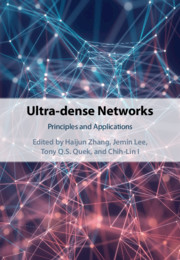Book contents
- Frontmatter
- Contents
- List of Contributors
- Part I Overview
- Part II Physical Layer Design
- Part III Resource Allocation and Network Management
- 9 Delay and Traffic Matching in Ultra-dense Networks
- 10 Traffic Offloading in Software Defined Ultra-dense Networks
- 11 Resource Allocation in Ultra-dense Networks
- 12 Wireless Edge Caching in Ultra-dense Networks
- 13 User Association in Ultra-dense Networks
- 14 UAV-Based Ultra-dense Networks
- 15 Generalized Low-Rank Optimization for Ultra-dense Fog-RANs
- Part IV Field Trials and Tests
- Index
10 - Traffic Offloading in Software Defined Ultra-dense Networks
from Part III - Resource Allocation and Network Management
Published online by Cambridge University Press: 12 October 2020
- Frontmatter
- Contents
- List of Contributors
- Part I Overview
- Part II Physical Layer Design
- Part III Resource Allocation and Network Management
- 9 Delay and Traffic Matching in Ultra-dense Networks
- 10 Traffic Offloading in Software Defined Ultra-dense Networks
- 11 Resource Allocation in Ultra-dense Networks
- 12 Wireless Edge Caching in Ultra-dense Networks
- 13 User Association in Ultra-dense Networks
- 14 UAV-Based Ultra-dense Networks
- 15 Generalized Low-Rank Optimization for Ultra-dense Fog-RANs
- Part IV Field Trials and Tests
- Index
Summary
Recently, software-defined networking (SDN) has been expected as an efficient technology to realize flexible resource management and system performance control by separating resource management from geo-distributed resources, especially for heterogeneous ultra-dense networks (HetUDNs). This work establishes an SDN based architecture for mobile traffic offloading in HetUDNs, which consist of densely deployed macro-cell base stations (MBSs) and small-cell base stations (SBSs). Additional, we explore a scenario with information asymmetric, specifically, the capacity of the SBSs can be accessible, but their performance for offloading cannot be obtained by the controller of SDN. To address such asymmetry, we propose a bundle of traffic offloading contracts, which are capable of encouraging each SBS to select the right contract that designed personally to it by promising its maximum utility. Moreover, by designing the contracts which offer rationality and incentive compatibility to different SBS types, the characteristics of a large number of SBSs are aggregated to support the efficient selection on SBSs to provide traffic offloading. Then a closed-form expression for SBS types is proposed, and we prove the monotonicity and incentive compatibility of the resulting contracts. Furthermore, simulation results validate the system performance, and the effectiveness and efficiency of the proposed contract-based traffic offloading mechanism.
Keywords
- Type
- Chapter
- Information
- Ultra-dense NetworksPrinciples and Applications, pp. 164 - 192Publisher: Cambridge University PressPrint publication year: 2020
- 2
- Cited by

